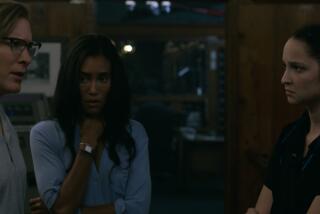Samuel Taylor; Playwright Co-Scripted ‘Vertigo,’ ‘Sabrina’
- Share via
Samuel Taylor, a playwright who turned some of his major Broadway hits into screenplays for classic motion pictures, including “Sabrina,” from his play “Sabrina Fair,” and “The Pleasure of His Company,” has died at age 87.
Taylor, who also co-scripted Alfred Hitchcock’s classic thriller “Vertigo,” died Friday at his home in Blue Hill, Maine.
Although he considered himself primarily a playwright, Taylor achieved his greatest fame from the films “Sabrina” and “Vertigo.”
He co-scripted the 1954 screenplay for “Sabrina” with Ernest Lehman and director Billy Wilder from “Sabrina Fair,” which starred Joseph Cotten and Margaret Sullivan on Broadway. The Cinderella tale of an older millionaire romancing his chauffeur’s daughter to keep her from marrying his playboy brother, only to fall for her himself, starred Humphrey Bogart, Audrey Hepburn and William Holden in the original film. A 1995 remake, which also credited Taylor, starred Harrison Ford, Julia Ormond and Greg Kinnear. The 1954 motion picture was nominated for an Academy Award.
Hitchcock, unhappy with two previous writers, asked Taylor to salvage the “Vertigo” script. The 1958 thriller starring James Stewart as a retired cop afraid of heights who is asked to keep tabs on a friend’s wife, played by Kim Novak, is regarded as one of Hitchcock’s best and most enigmatic films.
Taylor, according to the book “Vertigo: The Making of a Hitchcock Classic” by Dan Auiler, added characters, made the crucial decision to let the audience in on the film’s secret early in the movie and wrote much of the final script. Nevertheless, the Writers’ Guild ruled that Taylor had to share credit with an earlier writer, Alec Coppel.
In 1998, two years after a restored “Vertigo” was released, the American Film Institute designated “Vertigo” as one of America’s 100 best movies.
Taylor, who grew up in San Francisco and attended UC Berkeley when he wasn’t shipping out as a merchant seaman, added his own bits of Bay Area color to the “Vertigo” tale and utilized his childhood memories in “The Pleasure of His Company,” also set in San Francisco.
He co-wrote that play, a comedy of manners, with Cornelia Otis Skinner, who co-starred with Cyril Ritchard in the 1958 Broadway version. Taylor converted the play into the 1961 motion picture of the same title, starring Fred Astaire, Lilli Palmer, Debbie Reynolds, Tab Hunter, Gary Merrill and Charlie Ruggles.
Taylor turned another of his plays, the 1968 comedy “Avanti,” into the 1972 motion picture of the same title directed by Billy Wilder and starring Jack Lemmon.
The playwright also scripted such films as “The Eddie Duchin Story,” starring Tyrone Power, in 1956; “Goodbye Again,” starring Ingrid Bergman, Tony Perkins and Ives Montand, in 1961; “Rosie!” starring Rosalind Russell, in 1967; another Hitchcock film, “Topaz,” in 1969; and “The Love Machine” in 1971. Taylor tried his hand at directing in a 1957 Italian-made film he also wrote, “The Monte Carlo Story,” starring Marlene Dietrich.
Among Taylor’s other Broadway plays were “Beekman Place,” “A Touch of Spring,” “Flying Colors,” “Three by Three” and the Richard Rodgers musical “No Strings.”
Born in Chicago, Taylor moved to New York in the 1930s to write. He landed a job at the New Yorker magazine, but quickly discovered he disliked interviewing people, so he gravitated to theater to become a script doctor. He worked on the Clifford Goldsmith play “What a Life” and scripted many of the radio shows titled “The Aldrich Family,” which were based on it. Taylor also wrote several other radio and television scripts before becoming established as a playwright.
In 1987, Taylor was a distinguished artist in residence at the Department of Theater, Film and Television at UCLA’s College of Fine Arts.
He is survived by his wife of 60 years, Suzanne Combes Taylor; two sons, David of Brookline, Mass., and Michael of Berkeley; a stepdaughter, Ellinor of New York; and nine grandchildren.
More to Read
Only good movies
Get the Indie Focus newsletter, Mark Olsen's weekly guide to the world of cinema.
You may occasionally receive promotional content from the Los Angeles Times.






